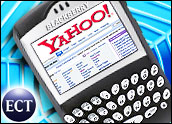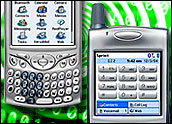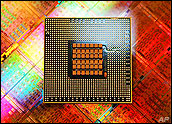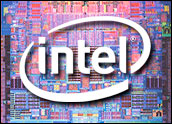
In announcing Thursday the release of its new Prada phone, LG Electronics didn’t claim it was competing with the heavily-hyped Apple iPhone scheduled to be released in June.
It didn’t have to. The media did it on its own with headlines boldly suggesting the iPhone already had a competitor.
Similar Design
Indeed, the new Prada Phone looks a lot like the forthcoming iPhone. It’s sleek and thin and it has a buttonless touch screen.
However, for all its smoothness and flatness, the Prada phone is an orange and the iPhone is — you guessed it — an Apple.
Like the iPhone, the Prada phone has a touch screen and a camera. Like the iPhone, it plays music and videos and it can show documents. Yet unlike the iPhone, the Prada phone doesn’t allow Internet use with a full-featured Web browser through common WiFi networks.
“I don’t think that this is a direct competitor to the iPhone,” said Chris Ambrosio, director of the wireless practice at Strategy Analytics. “LG is looking at this phone primarily to meet that continuing need for attractive style options and global markets. I think everybody wants to write about iPhone now and that’s a hot headline.”
Aiming for Style
The Prada phone has been in LG’s design works for more than two years, Ambrosio noted. LG, “struggling to be profitable” in its handset business, “has been too willing to go out and customize phone features and software for mobile operators” instead of focusing on making its phones stylish and “cool,” he asserted.
If nothing else, the Prada phone is a style statement. In describing the unit, LG uses the words “unique,” “sophisticated” and “elegant.” Although it also describes the phone as the world’s “first completely touch screen mobile phone, we’ve had wireless PDAs that have been doing that for a number of years,” Ambrosio explained.
The Prada phone and the iPhone are far apart for a reason much broader than technology, according to IDC Research Analyst Ramon Llamas. “It’s a Prada device,” he noted. “Prada is not for everybody. It’s a very specific market segment for people who enjoy much higher-end, luxury devices.”
While the iPhone won’t be cheap, it’s not designed for the rich and famous. “Is the iPhone just for upper echelon? No,” he said. “It might be for tech-savvy people, but you don’t have to be ultra-rich to get it.”
A Touch Too Much?
LG, and Apple, for that matter, are taking a risk with their move to touch screen cell phones, Ambrosio suggested. It might be a case in which the technology is impressive, but the real-world experience isn’t.
“A mass market phone offering touch screen is a risky step, a brave step, for LG,” Ambrosio declared. “What our research shows is users don’t like touch screen panels [on mobile phones]. Touch screens have not been historically well-received in consumer use.”
Consumers probably will like the bigger screens for video viewing, but when it comes to “simple voice calling” the smudge-prone touch screens might actually prove to be annoying, he concluded.
LG’s new phone, priced at 600 euros (US$777), is scheduled to go on sale in late February in Britain, France, Germany and Italy. Then it will be sold in Asia. No mention was made of plans for a United States rollout.
The iPhone is expected to cost about $600 for the high-end model. Not that we’re comparing.




















































